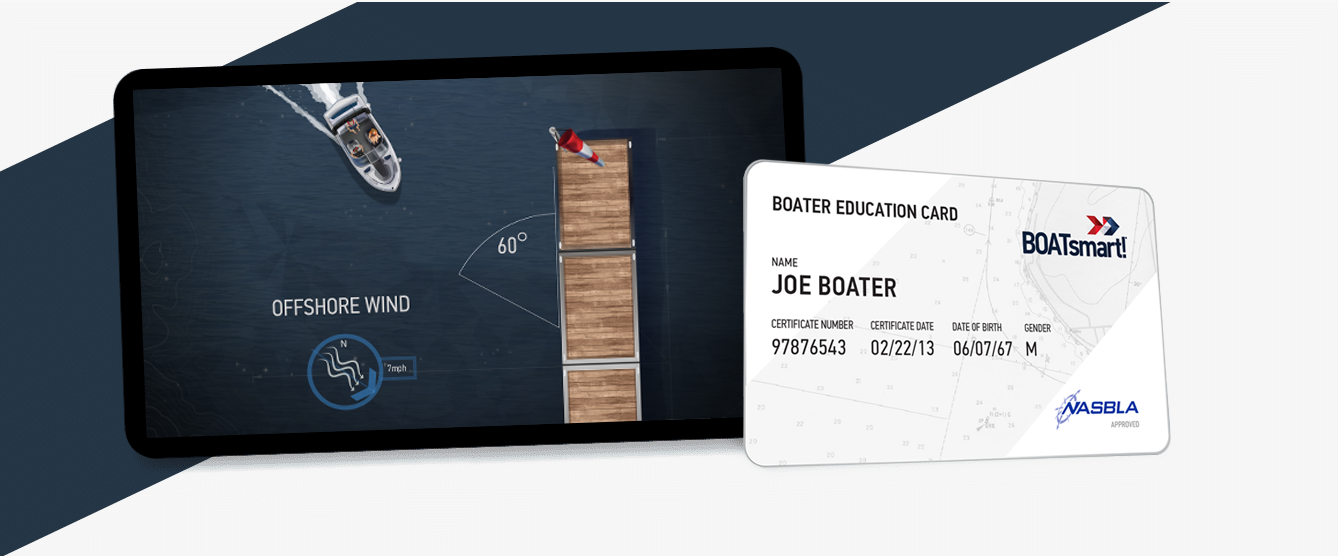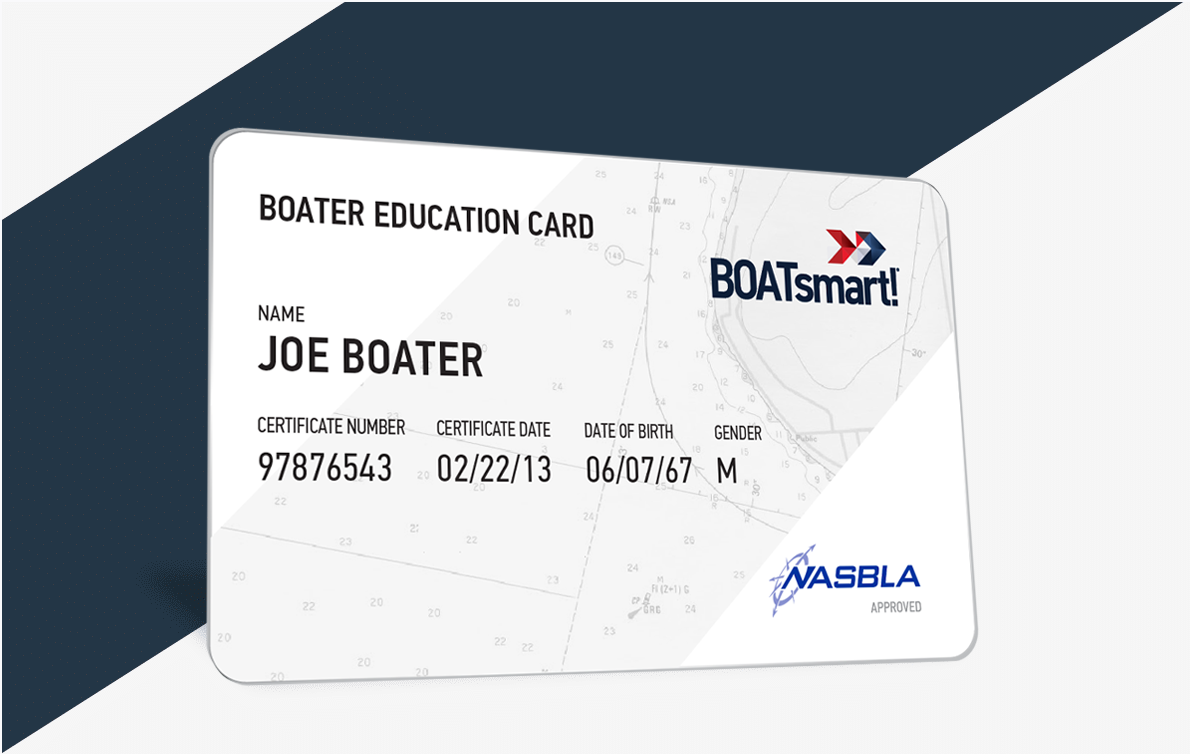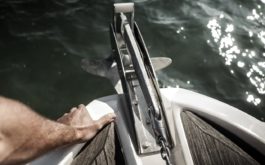BOATER EDUCATION ID CARD
Under the Roberson/Archer Act of 1944, any person operating a motorized boat on Alabama waters must obtain an Alabama Boater Safety Certification—this includes the operators of personal watercraft operators (PWCs).
Boat operators are required to carry their Alabama Boater Safety Certification, also called a boating license, on board with them during boat operation and they must have the certification available for law enforcement to inspect, if they request to do so.
You must be 12 years of age or older in order to obtain Boater Safety Certification in the state of Alabama. To obtain certification, you must do the following:
- Visit the Department of Public Safety Driver’s License Examining Office in their county of residence.
- Submit an application and pay a $5 fee.
- Show photo identification to the license examiner.
- Answer medical questions.
- Successfully complete a written or oral exam, or provide proof of exemption (i.e. a Boating Safety Course Certificate, or age exemption).
- Provide the proper documentation to the Probate or License Commissioners office in order to have the ‘V’ Class placed on their drivers license (those without a drivers license will be issued a ‘Vessel Only’ license).
Boater safety certifications can be cancelled, revoked or suspended if a person is found operating a boat while under the influence, or operating a boat in a careless or reckless manner.
Exemptions
- Operators of sailboats, rowboats and canoes.
- A person who has a valid USCG Motorboat operator’s license.
- An operator born prior to April 28th, 1994.
- A person who has just purchased a boat is able to operate the boat without certification for up to 30 days after the date of sale, so long as the boat is registered in their name and they are carrying the bill of sale on board.
- A person operating a rented boat that has been provided with instruction on the safe operation of the boat by the rental company (the person’s operating privileges must not have been revoked or suspended).
- A person who has obtained a valid certificate of completion of a United States Power Squadron Boating Course or a USCG Auxiliary Boating Course. Either of these fulfills the boating safety certification requirements.
Age and Horsepower Restrictions
It is illegal for any person under 12 years of age to operate a motorized boat (including personal watercraft (PWCs), at any time.
Any person 14 years of age or older may operate any boat (including a PWC) without supervision so long as they have obtained their Boater Safety Certification and are carrying the certification during operation.
Supervision Requirements
Any person aged 12-13 may obtain their Boater Safety Certification and may operate a boat after the certification has been obtained, however they must be supervised during operation. The supervisor must 21 years of age or older, have obtained their Boater Safety Certification, and they must be seated in a position to take immediate control of the boat, if required.


Get your Official North American
Boating License
The Official NASBLA and State-Approved Boating Course, Test & License.
Get your Official North American
Boating License
The Official NASBLA and State-Approved Canada Boating
Course, Test & License.
Reciprocity
Non-residents that are 12-13 years of age, may operate a boat on Alabama waters if they are supervised by a person on board who:
- Is 21 years of age or older.
- Is in a position to take control of the boat immediately, if need be.
- Has obtained their Alabama Boater Safety Certification (unless the supervisor is also a non-resident, in which case they are not required to have their certification, unless they are operating in Alabama for more than 45 days per calendar year).
Non-residents 14 years of age or older may legally operate a boat on Alabama’s waterways for up to 45 days per year, after which time they are required to obtain their Boater Safety Certification. This can include Alabama non-resident certification or certification from the operator’s home state.
ALABAMA LIFE JACKET REQUIREMENTS
In Alabama, all children under 8 years old on your boat must wear a life jacket. If you are older than this age, you must wear a life jacket if you are:
- Being towed on a tube or water skis.
- Riding a Jet Ski, Sea-Doo, or other personal watercraft vehicle.
- Boating within 800 feet of a dam.
While other water activities don’t require a life jacket to be worn, Alabama law does require you to have at least 1 life jacket on board per passenger (for example, if you have 4 people on board, there must be at least 4 life jackets on the boat).
The Alabama Marine Patrol Division suggests you follow these tips to keep yourself and others safe while in the water:
- Wear a life jacket at all times while on a boat.
- Be aware of your surroundings, including other boaters.
- Know the laws and rules of the waterway you are in.
- Be considerate of other boaters and exercise safe and courteous boating practices.
BOATING AND ALCOHOL
Boating and alcohol laws vary from state to state. In Alabama, it is illegal to operate, or be in physical control of any boat, or manipulate any waterskis, aquaplane, or any other marine transportation device on the waters of the state, while under the influence of alcohol or controlled substances, or drugs.
In Alabama, a person is considered to be under the influence if:
- They are found to have a Blood Alcohol Concentration (BAC) level of 0.08 or higher.
- They are under the influence of alcohol, drugs, controlled substances or any combination thereof.
- They are under the influence of any substance which impairs their physical or mental abilities.
In Alabama, a person who is convicted of operating a boat while under the influence will be subject to the following penalties:
Violations
Upon a first violation:
- A fine up to $2,100 and/or ;
- Imprisonment for 1 year and;
- The suspension of their operators certification for 90 days.
Upon a second violation:
- A fine up to $5,100 and/or;
- Imprisonment for up to 1 year (mandatory jail sentence of 5 days minimum OR community service for a minimum of 30 days) and;
- The suspension of their operators certification for 1 year.
Upon a third violation:
- A fine of more than $10,000 and/or;
- Imprisonment for up to 1 year (mandatory sentence of 60 days minimum) and;
- The suspension of their operator’s certification for 3 years.
Implied Consent
If law enforcement have probable cause to believe that an operator is under the influence, they have the authority to administer and test the operator at the scene, using a field breathalyzer or other approved device, to determine if the operator is under the influence of alcohol. Refusal to submit to testing will result in the same penalties for operators of motor vehicles on Alabama state highways.
Alabama Law Enforcement
Boating laws in Alabama are enforced by:
- Marine Police Officers.
- County Sheriffs.
- All other officers of the Alabama Department of Conservation and Natural Resources.
- The USCG.
Law enforcement in the state of Alabama have the authority to stop and board any boat in order to ensure it is in compliance with state and federal laws. The USCG has enforcement authority on federal waters.
Operators are required to stop their boat, allow the enforcement officer to come alongside, and allow them to inspect their boat registration and safety equipment, if requested to do so.
BOAT REGISTRATION AND TILTING
Alabama law requires all motorized boats, sailboats and rental boats to be registered. Once a boat has been registered, you will be provided with an Alabama Certificate of Number and validation decals, both of which are legally required in order to operate the boat.
Exemptions:
- Human-powered boats (except sailboats and rental boats).
- Boats operating under a valid, temporary Certificate of Number.
- Boats that have been registered in another country and that are temporarily using Alabama’s waters.
- Boats that are owned by the U.S. government, or a state, county or municipality.
- A ship’s lifeboat.
Boats can be registered in the state of Alabama by submitting an application and fee to the office of Judge of Probate or the county License Commissioner in your own county.
Boats that have been registered will be provided with an Alabama Certificate of Number. The Certificate of Number must be carried on board the boat at all times and be available for inspection by law enforcement, during operation.
REgistration Number and DEcal Placement
- The registration number must be painted, applied as a decal or otherwise affixed to both sides of the bow.
- The number MUST be placed where it can be easily read.
- No other numbers may be displayed in this area.
- The registration number must be at least 3 inches high and in block letters of a color that contrasts with the color of the boat.
- The numbers must be read from left to right (on both sides).
- The letters of the registration number must be separated from the numbers by a hyphen or by an equivalent space.
- The validation decals must be affixed on each side of the boat, in line with the registration number and within 6 inches fore or aft of the number.
Other Boat Registration Information
If your Certificate of Number is lost or damaged (needs to be replaced) you will be required to pay a processing fee and apply to the issuing office to obtain a new copy. Additionally, if there is a change of address, or a boat is lost, stolen, abandoned or destroyed, the boat owner is required to notify the Alabama Marine Police Division within 15 days of the change.
Alabama’s boat registration system operates on a staggered basis. The first letter of your last name will determine the month of renewal.
ALABAMA LAWS ON RECKLESS BOAT OPERATION
It is illegal in the state of Alabama to operate a watercraft in a reckless or careless manner.
A person is guilty of reckless boat operation if they operate any boat, or manipulate any waterskis, aquaplane, or other marine transportation device, upon the waters of the state in willful or wanton disregard for the safety of persons or property at a speed, or in a manner to endanger, or likely to endanger, life, limb, or damage property of, or injure, any person.
A person in violation of this law will be guilty of a Class A misdemeanor.
Examples of reckless operation include:
- Weaving through heavy boating traffic.
- Changing direction at the last moment to avoid a collision.
- Jumping the wake of another boat.
- Circling or ‘buzzing’ around a person or another boat on the water.
- Violating navigation regulations.
- Operating a boat within 100 feet of a diving flag.
A person is guilty of careless operation if they operate in a manner that endangers the life, limb or property of any person, through negligence, carelessness or inattention on the waters of the state.
Any person in violation of this law will be guilty of a Class B misdemeanor.
Examples of Careless Operation
Examples of careless operation include:
- Not maintaining a proper lookout for other boating traffic or for people in the water.
- Operating a boat that has not been equipped with the required safety equipment.
Additionally, in Alabama it is illegal to:
- Overload a boat.
- Exceed a boat’s maximum horsepower capacity.
- Sit in any position that is above the gunwale or cap of a boat while the boat is moving above idle speed.
- Ride on the bow of a boat that has not been equipped with handrails.
- Ride on a boat with your lower extremities hanging over the gunwale or cap of the boat.
Speed Restrictions
In Alabama, it is illegal to:
- Operate a boat in a manner and at a rate of speed which will create a hazardous wake or wash when approaching another boat or when entering or exiting a harbor or marina area.
- Operate a boat above ‘plane’ speed when people or equipment are positioned in such a way that the operators view and the safe operation of the boat would be impaired.
- Operate a boat in violation of any established speed zone (i.e. exceed speed limits that have been posted, such as ‘Slow-No Wake’ zones or other speed restriction areas).
Restricted Zones
No person shall under any circumstances operate a boat on the waters of Alabama in excess of a speed zone established by regulation of the Commissioner of Conservation and Natural Resources. The Commissioner may promulgate rules and regulations establishing speed zones, in areas on the waters of this state as deemed hazardous by the commissioner.
Accident Reporting Requirements
A boat operator who has been involved in a boating accident is required to:
- Stop their boat at the scene.
- Provide assistance to any person who has been injured, or who is in danger, so long as they can do so without risking their safety or that of their passengers.
- Provide their name, address and boat information in writing to any person who was injured and to the owner of any property that was damaged as a result of the accident.
A written accident report must be submitted to the Alabama Marine Police Division if any of the following occur as a result of the incident:
- A person is killed or disappears from the boat.
- A person is injured and is incapacitated for more than 72 hours.
- Damage to the boat(s) or property totals more than $2,000.
The accident report form must be submitted to the Marine Police Division within 10 days of the incident, on the appropriate form provided by Marine Police Officers, the county Sheriffs Office or the Marine Police Division.
A uniformed police officer, state trooper, state law enforcement officer, state marine police officer, county sheriff, deputy or member of a municipal police force has the authority to arrest any individual at the scene of the accident, if they have reasonable grounds to believe that the person contributed to the accident. They may arrest the person without warrant, even if the enforcement authority did not personally see the violation.
Any person who unlawfully and unintentionally causes the death of another person while violating any law or regulation applying to the use of a vehicle or boat, will be guilty of homicide.
ALABAMA DMV CONTACT INFORMATION
For more information about safe boating in Alabama, contact:
Alabama Department of Motor Vehicles
301 South Ripley St.Montgomery, AL 36102









